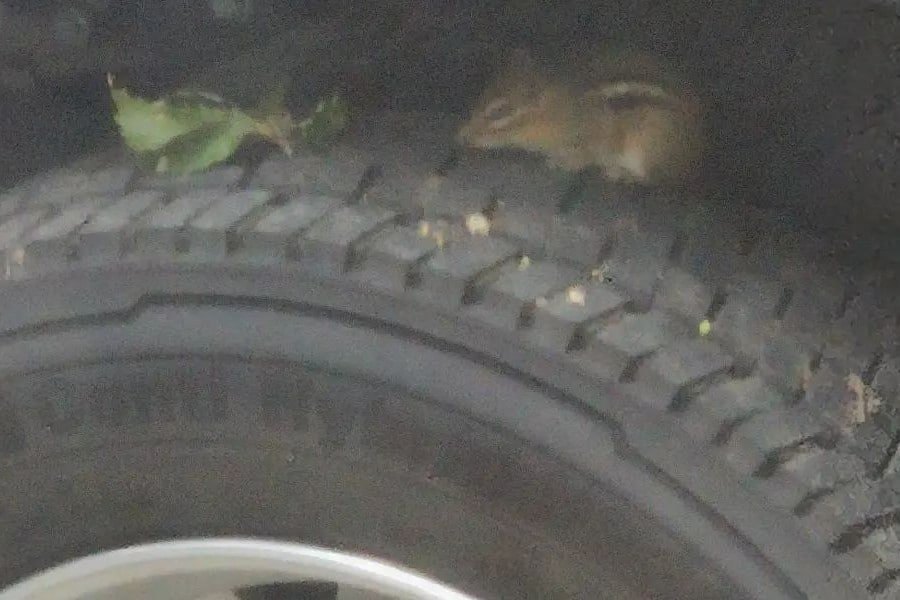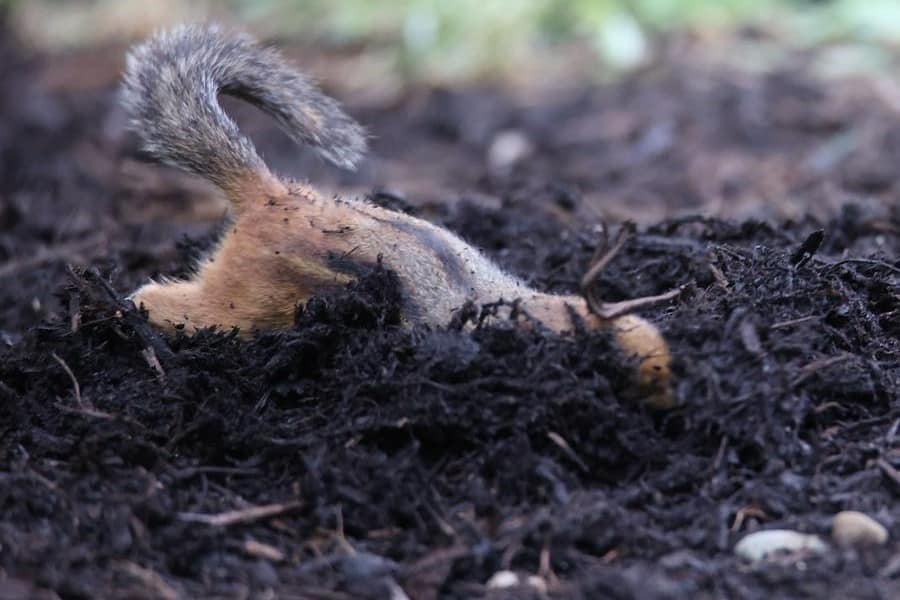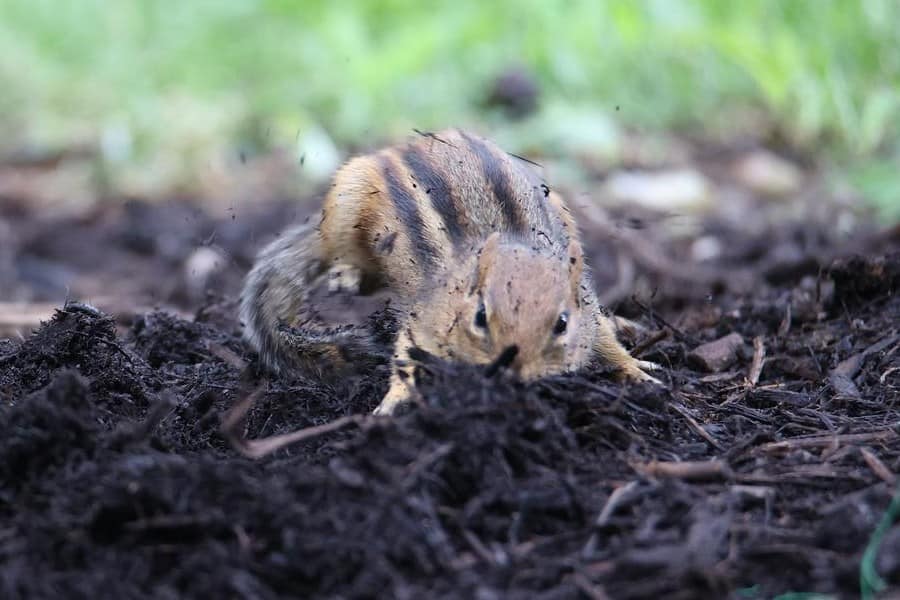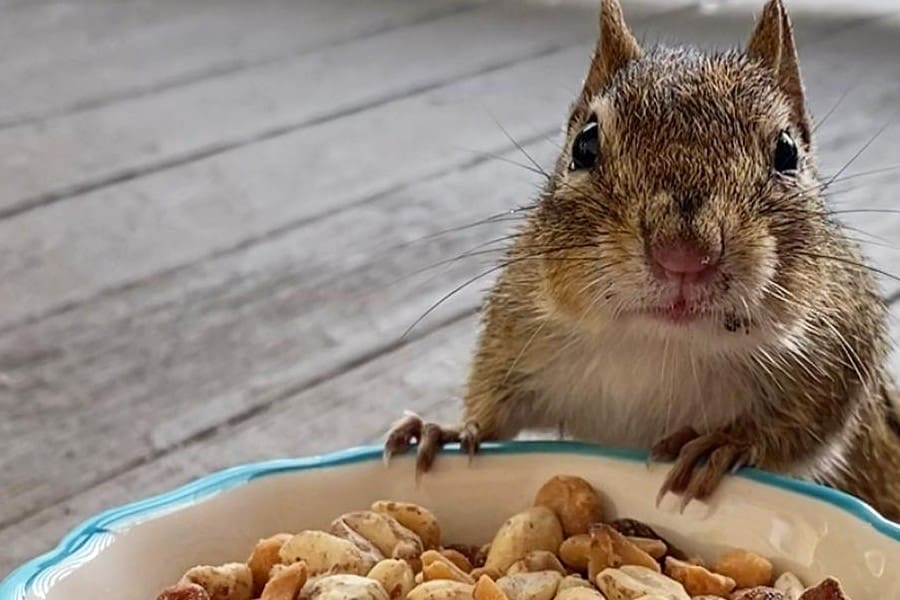Chipmunks seem like harmless creatures. In fact, if you do not find them and do not eliminate them on time, they can cause significant damage to your property. They’ll eat your plants, gnaw on your wiring, dig deep holes, and can also infect you with dangerous diseases (Tularemia, encephalitis, Toxoplasmosis, etc.).
If you try to catch them with your bare hands, you risk getting bitten, so it’s essential to know how to get rid of chipmunks in garage properly. In this article, I’ve detailed the basic steps to identify signs of rodent infestation and methods of cleaning up the area.
[wpsm_titlebox title=”How to Get Rid of Chipmunks in Garage?” style=””main””]
When you find a chipmunk in your garage, determine what attracts these pests to your area. Make the room unattractive to keep chipmunks out of garage: use cat litter, DIY cayenne pepper spray, and naphthalene mothballs. Install live traps to catch animals without harming them.
[/wpsm_titlebox]
What Attracts Chipmunks to the Garage?

Attracting the attention of these rodents is not at all difficult. Like any other living creature, they can come to you in search of food, water, and shelter. If all this is on one site within reach, with a high degree of probability, they will settle there for a long time. So let’s take a closer look at the things you can have indoors and outdoors that can trigger chipmunks:
- Fruiting plants. If you grow shrubs, trees, and other vegetation that produces sweet fruits, seeds, and nuts, you can be sure they will attract wild animals.
- Insects. Chipmunks are omnivorous creatures; therefore, they do not mind feasting on protein-rich insect larvae. If your garage has a bug problem, rodents can make it worse.
- Garbage. Usually, these animals prefer fresh food. But with no other options, they can feast on human food leftovers, which you can leave or accidentally drop in the garage or throw in a loosely closed dumpster.
- Water. All animals need regular access to water. Are your pipes leaking or rainwater collecting in your basement? Be prepared for pest infestation.
- Shelter. Often garages are used by owners as a warehouse for unnecessary stuff. Piles of garbage are a favorable environment for the appearance of chipmunks. Although they generally prefer to live outdoors, they can occasionally be seen in chimneys, vents, near heaters, and other heating devices.
Basically, all you need to do to attract chipmunks is neglect your house a little. All of the above factors make your garage an ideal environment for a wide variety of pests.
Signs of a Chipmunk Infestation

Seeing one chipmunk in my garage is not enough to call the situation an infestation. However, it is a warning sign to take seriously and look for other signals:
Paw prints of rodents on the floor and other flat surfaces in the garage;
- Gnawed wires, seals, furniture, and other soft objects;
- Holes in the lawn in the area adjacent to the garage;
- Bitten fruits, vegetables, scattered peel of nuts and seeds;
- Rodents’ excrements;
- Ruined bird feeders.
Chipmunks are, by nature, solitary creatures; they do not live in large families. However, if there are all favorable conditions for life in your garage or the local area, you will most likely find more rodents. They are active in the morning and evening, so at this time, you can see creatures running or hear their characteristic squeak (or whistle) they make.
Although experts usually rate chipmunks as a low threat with the minimum economic loss for large farms, they can cause significant damage to small farms and individuals. Do not let the situation take its course and hope the problem will be solved by itself. When you detect the first signs of rodents, you should take measures to scare them away and protect your home from their reappearance.
How to Get Rid of Chipmunks From Your Garage
You can use several methods to get rid of chipmunks living in your garage. I am a supporter of a humane approach to the eviction of unwanted neighbors. Therefore, I have described ways to get rid of chipmunks without killing or causing serious harm.
Step 1: Remove all things that attract rodents

Learn about the factors listed in the first section that can cause wild animals to appear in your garage and yard, and get rid of them:
- It is important to block rodents’ access to food and water and collect all fallen vegetables, fruits, and nuts if fruit-bearing plants grow near the house.
- If you have a bird feeder installed, remove it or regularly pick up falling seeds from the floor.
- Check all storage containers in the garage for holes and cracks; make sure the lids fit snugly so that small pests cannot get inside.
- If necessary, replace the old cracked waste bin with a new one with a secure lid.
- Repair any leaking pipes and cracks in walls and foundations.
- If there are piles of garbage in the garage (for example, a bunch of wooden pallets), you need to remove them.
- All ventilation openings should be closed with a fine metal mesh to prevent rodents from re-entering.
Remember that chipmunks are quite shy creatures. They don’t feel comfortable in open spaces, so you need to do everything possible to ensure they have nowhere to hide in your garage.
Step 2: Use repellents
Making your garage and surrounding area unattractive to chipmunks is easy. To create the most repellents, you will probably find the necessary ingredients in your kitchen.
Cayenne pepper
The powerful smell and taste of cayenne pepper repel many pests, including chipmunks, as it strongly irritates the mucous membranes of the eyes and respiratory tract. You can make an effective spray using it. Mix a tablespoon of spice with a glass of plain water and pour this mixture into a spray bottle.

Try to treat all the cracks and secluded places in your garage with this remedy. You can also sprinkle dry cayenne pepper around the room or use a dry sprayer if you have one. If you wish, you can buy fresh peppers, cut them into several pieces, and scatter them in secluded places in the garage. The stronger the smell, the faster the pests will run away from your area.
Cat litter
Chipmunks, like many wild animals, have a keen sense of smell. They are also terrified of pets, so to scare them away, you can either get a cat or a dog or use their waste, such as cat litter. If you don’t have a pet or don’t want one, borrow used cat litter from your friends or family and put it in your garage for a while.
Renew it periodically to keep the smell as strong as possible. When the last signs of rodents disappear, thoroughly clean the room.
Coffee grounds
It is another product with a strong smell. You probably drink coffee regularly, so don’t throw the grounds in the trash, but find more good uses. If you don’t fancy coffee, you can ask for grounds at any nearest coffee shop. Scatter coffee residue inside and outside your garage to keep pests away.
Keep in mind that the scent dissipates pretty quickly, so you will need to reapply regularly (I recommend doing it daily). It should not be a big deal for coffee fans.
Peppermint oil

Peppermint oil smells much nicer to most people than old coffee grounds. At the same time, it has an equally repulsive effect on rodents. If you have a bottle of this oil on hand, dilute a teaspoon of it with a glass of water and treat all the cracks, entrances, and exits to the garage. All essential oils fade fairly quickly, so you’ll need to reapply them regularly to keep your spray effective.
Be careful, as peppermint oil can be an allergen for people with high sensitivities.
Mothballs
The naphthalene found in mothballs has an extremely strong and repulsive odor. Rodents do not tolerate it and prefer to stay away. Use this method carefully because, in large quantities, this substance can be toxic to pets and even people. After getting rid of chipmunks, it is recommended to ventilate the room thoroughly.
Liquid repellents and ultrasonic devices
In stores, you can find professional pest control products. Among them are liquid concentrates that need to be diluted in water and sprayed on infected premises. Choose non-toxic repellents so you don’t harm the environment. Also, on the market, many ultrasonic devices are aimed at repelling rodents.
Experts still argue about their real effectiveness, so you can choose other proven methods for your tasks.
Step 3: Catch chipmunks
In addition to using a rodent deterrent, you can set up live traps in areas where chipmunks may run through during the day. It is humane to capture wild animals as they remain alive inside cages or boxes. After trapping the creature, take it to nature and release it. Combine this approach with the other methods described and clean up your garage to get rid of pests for good.
A few words about killing chipmunks

As I said, I favor humane methods of dealing with chipmunks since pests are an integral part of the ecosystem. However, I will briefly cover some lethal methods to make my guide as complete as possible. You can use poisonous liquid repellents, mousetraps, fruit gum (they get stuck in the digestive tract and kill rodents), and even small caliber guns to keep chipmunks out of garage.
Keep in mind that depending on your region, laws may prohibit lethal methods. In the United States, the killing of chipmunks is not banned at the state level; however, in some states, there are acts that completely or partially prevent it (for example, by prohibiting the use of guns).
FAQ on How to Get Rid of Chipmunks in Garage
This section will give you more information about pest control in your garage. If anything remains unclear, ask your question in the comments section.
What do chipmunks hate the most?
Like all wild animals, chipmunks cannot tolerate strong-smelling substances. These include cat urine (ammonia), peppermint, mothballs, coffee, cayenne pepper, and so on. Pests stay away from dogs, cats, owls, and other predators, so using their fur or urine is a good idea. Also, rodents do not like open spaces and empty rooms; they always look for somewhere to hide.
So keep your garage and garden in order. Besides, pests often move in search of food and water. So, if they don’t have access to them in your home, they will quickly move elsewhere.
What is a home remedy to get rid of chipmunks?

By and large, any remedy with a sharp, strong, and persistent smell can be used as a home remedy. If you have cayenne or chili peppers in your kitchen and mothballs just lie around in your closet, feel free to use them in the garage to repel rodents.
Even the neighbor’s cat can be a chipmunk helper if you ask your neighbor to share a cat litter with you. Also, you can plant marigolds, hyacinths, poisonous daffodils, and onions in flower beds or pots to deter pests.
What scent will keep chipmunks away?
There are many powerful scents that rodents prefer to avoid: peppermint, cayenne pepper, mothballs, citrus, eucalyptus, and so on. It is because they irritate the mucous membranes of their noses and eyes and prevent chipmunks from fully assessing the situation to avoid encounters with predators.
These two reasons will make pests leave your garage. Also, rodents run away when they smell cats, foxes, or coyotes. You can use their fur or urine pellets.
Get Rid of Unwanted Neighbors Permanently
Don’t be fooled by the chipmunks’ cuteness. These are real destroyers that can also bring serious diseases. Luckily, they are quite shy creatures, so you can repel them with natural remedies that you can make yourself or use ready-made chemical products. And, of course, the key to getting rid of rodents forever is order in the garage and surrounding area.
If you have had to deal with chipmunks, please tell me which methods were effective for you in the comments! Did you use DIY tools, or do you prefer ready-made products? How do you feel about lethal pest control methods?

